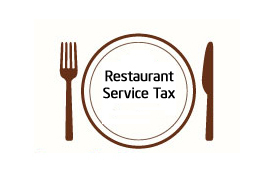The Service tax on Restaurant was originally levied in the year 2011 with certain conditions like restaurant having facility of air-conditioning and license to serve alcoholic beverages are liable. Presently, all the restaurants having Air conditioning facility /Central heating system are subject to tax even if it does not have a bar license and are required to pay tax @4.944% on the value of services. Similarly, the short term accommodation in hotel, inn or guest house etc. is also liable to service tax having a declared tariff above rupees one thousand per day.
The Kerala High Court in a recent judgment delivered on 03.07.2013 has declared the imposition of Service Tax on Hotels and Restaurants as “Unconstitutional”. While disposing off the writ petition no: WP (C) No:14045 of 2011 in case of KERALA CLASSIFIED HOTELS AND RESORTS ASSOCIATION along with other similar Writ Petitions, the Hon’ble Court took the view that the levy of Service Tax on Restaurants is beyond the legislative competence of the Parliament.
The main contention raised by the petitioners is with reference to the legislative competence of the Parliament to impose a tax on sale of goods which is absolutely the domain of the state legislation.
Whereas it was argued by the revenue that service tax can be imposed on the service involved during the sale of a product and so long as the Statute does not transgress to any restriction contained in the Constitution, contentions regarding lack of legislative power cannot be sustained. Service tax levied by the Government of India is not for serving alcoholic beverages and it is a tax on the services provided by restaurants and hotels.
In view of the above backdrop, the following arises for consideration by Hon’ble Court:
(i) Whether “taxes on the sale and purchase of goods” in Entry 54 of List II of the seventh schedule covers service in the light of the definition of “tax on sale and purchase of goods” under Article 366 (29A) (f) of the Constitution of India.
(II) Whether the service provided in a hotel, inn, guest house, club etc. imposed with luxury tax under State Act in terms of Entry 62 of List II can be separately assessed and imposed by the Union with service tax, invoking the residuary powers at Entry 97 of List I of the Constitution.
The Hon’ble Court in its finding held that the very purpose of incorporating the definition of tax on sale or purchase of goods in Article 366 was to empower the State Governments to impose tax on the supply, whether it is by way of or as a part of any service of goods either being food or any other article for human consumption or any drink either intoxicating or not intoxicating whether such supply or service is for cash, deferred payment or other valuable consideration. The words ‘and such transfer delivery or supply of goods’ is deemed to be a sale of those goods by the person making the transfer. Therefore the incidence of tax is on the supply of any goods by way of or as part of any service. When food is supplied or alcoholic beverages are supplied as part of any service, such transfer is deemed to be a sale. Apparently, the transfer is during the course of a service and when the deeming provision permits the State Government to impose a tax on such transfer, there cannot be a different component of service which could be imposed with any service tax in exercise of the residuary power of the Central Government under Entry 97 of List I of the Constitution of India. Therefore it can be seen from Article 366(29-A) (f) that service is also included in the sale of goods. If the constitution permits sale of goods during service as taxable necessarily Entry 54 has to be read giving the meaning of sale of goods as stated in the Constitution. If read in that fashion, necessarily service forms part of sale of goods and State Government alone will have the legislative competence to enact the law imposing a tax on the service element forming part of sale of goods as well, which they have apparently imposed. This view was taken in the light of the Constitution Bench judgment in K. Damodarasamy Naidu’s case.
Now, coming to the next question regarding the imposition of service tax in respect of hotel, inn, guest house, club or camp site etc., the contention of the petitioners is based on Entry 62 of List II. What exactly is the meaning of the expression ‘luxuries’ in Entry 62 of List II has been held by the Constitution Bench judgment of the Supreme Court in Godfrey Philips India Ltd , wherein it is held that luxuries is an activity of enjoyment or indulgence which is costly or which is generally recognized as being beyond the necessary requirements of an average member of the society. While giving the said meaning to Entry 62 and if we look at the sub Clause (zzzzw), the service tax is imposed on services provided in a hotel and other similar establishments when State Legislature had enacted the Kerala Tax on Luxuries Act by exercising their legislative power under Entry 62 of List II. When applying the dictum laid down in Godfrey Philips India Ltd. (Supra) which gives an extended meaning to the word ‘luxuries’, the Court took the view that the amendment now made to the service tax trenches upon the legislative function of the State under Entry 62 of List II.
Having come to the aforesaid findings, the Hon’ble Court allowed the Writ Petitions as follows:
i) It is declared that sub Clauses (zzzzv) and (zzzzw) to Clause 105 of Section 65 of the Finance Act 1994 as amended by the Finance Act 2011 is beyond the legislative competence of the Parliament as the sub Clauses are covered by Entry 54 and Entry 62 respectively of List II of the Seventh Schedule.
ii) That if any payments have been made by the petitioners on the basis of the impugned clauses, they are entitled to seek refund of the same.
Authors Comments:
The fight between the State and the Centre on taxing a single transaction by each is not new to the taxation law. It has come before different Courts on several occasions. Each time the judiciary is put to litmus test to determine the respective jurisdiction of Centre and the State. Examples can be cited of the cases of BSNL and Idea Mobile Solutions which are landmark judgments. Similarly, in present case also it was challenged before the Hon’ble Kerala High Court that levy of Service Tax on Restaurants and Hotels is beyond the legislative powers of the Centre. The State has got only jurisdiction to levy sales tax . In terms of clause (f) of Article 366(29A) even the service portion has been specifically included as a part of ‘deemed sale of goods’ and is entirely covered under powers of the State Government under List II i,e State List.
As per section 65B(44)(a)(ii) of the Finance Act,1944, an activity which constitutes merely transfer ,delivery or supply of any goods which is deemed to be a sale within the meaning of Article 366(29A) of the Constitution of India is not a ‘service’ and hence service tax cannot be imposed.
Though the levy of Service Tax is held as unconstitutional by the Kerala High Court (Single Judge Bench) but now it would be really interesting to see the move of the revenue. The author has received many queries regarding course of action to be taken by the assessee on the basis of this judgment. It was enquired upon whether to stop further payment of service tax or to continue. In view of author, though the said judgment seems to be applicable universally but still it is very difficult to answer this question especially at this stage. There is every possibility of going the matter to higher forum may it be Division Bench of Kerala High Court or may it be Apex Court. Hence presently, nobody knows what will be the fate of the case at such higher forum. Let us wait and watch if CBEC issues any circular/clarification on the basis of said judgment. So, to be on the safer side, it is the personal view of the author that those who are already registered and collecting the service tax from the customers should continue to pay the same. The full text of the judgment is available at: http://www.indiankanoon.org/doc/124917211/



